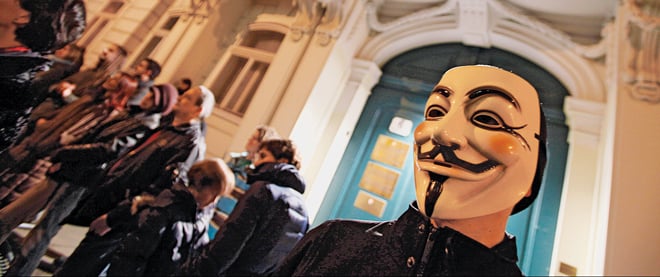Anonymous morphs into a political movement
The hacker group’s hit list has grown to include Arab dictatorships and opponents of WikiLeaks
Photo: REUTERS/Lisi Niesner
Share

Gone, for Anonymous, are the days of aimless Internet hijinks. The hacker group, once a loosely knit group of cyber-pranksters that formed in 2003, has traded prank pizza deliveries and shock humour for high-profile attacks on authoritarian regimes. The community now attracts both political activists and hackers alike to campaigns targeting everyone from Arab dictatorships to opponents of WikiLeaks.
Last week, Anonymous carried out its latest offensive on an Arab government, when hackers swapped content on the Syrian Ministry of Defence website with a message calling on protesters to take down President Bashar al-Assad’s regime, which has killed an estimated 1,700 citizens since uprisings began five months ago. In June, the group claimed responsibility for revealing the passwords of hundreds of Bahraini, Egyptian, Moroccan and Jordanian government officials’ email accounts. And during the early stirrings of the Tunisian revolution in January, Anons (as the group’s adherents are known) created care packages that included instructions on how to conceal identities online and developed a script to help bloggers and news sources dodge a government-led phishing campaign. “It is simply impossible to list all countries that need help,” the maturing collective proclaimed on the @AnonymousIRC Twitter account on Aug. 9. “We try our best.”
Other recent targets include businesses that withdrew their services from WikiLeaks when, in December, the organization released secret diplomatic cables, and the Orlando, Fla., Chamber of Commerce, after members of the group Food Not Bombs were arrested for feeding the city’s homeless, against local laws. But the clandestine computer hacking group wasn’t always so interested in altruism. While Anons have maintained that their work is ultimately motivated by freedom of speech and anti-censorship ideals, it grew out of the notorious 4Chan message boards: an Internet repository for lolcats, anime and multiple genres of porn.
“It is a fascinating evolution,” New York-based application security expert Hugh Thompson told Maclean’s. “It’s becoming less annoying and more focused on tactical issues,” adds computer security expert David Skillicorn of Queen’s University. While Anonymous’s decentralized structure makes it difficult to attribute a change in direction to a particular group of people, he says, there has been a clear change in tone.
The community’s structure, however, makes it difficult to define its political values or to get hackers to support a singular goal or cause, says Thompson. If there’s no leadership, he adds, it’s very difficult to maintain a vision. “It’s about agreeing with a particular direction or style,” says Skillicorn, rather than “having a vote and approving various kinds of activities.”
Indeed, the group has no formal membership or constitution, and analysts often compare its decision-making process to a hive, where a majority—not a hierarchy—determines which campaigns they undertake. For this reason, Skillicorn says Anonymous should be understood as a brand rather than an organization: “People are coming in and out of the group and in and out of campaigns. Anyone can claim to be Anonymous and there’s really no way to disprove it,” he says.
The future for Anonymous, it seems, is not just political. In December, an Anonymous operation targeted Sony’s website and its executives after the electronics giant launched a lawsuit against a man who hacked the company’s PlayStation 3 console; in June, Spanish police arrested three hackers allegedly operating under the Anonymous umbrella in connection to the Sony hacks. And cracks in the community’s structure appeared last week when a viral video claiming to be from Anonymous threatening to “kill” Facebook on Nov. 5 was denounced by members of the group. One member explained the operation had been planned, but abandoned, until other Anons stumbled upon the remnants of the blueprint in a chat room and rebooted the operation. Another high-profile Anon took to Twitter, calling into question the feasibility of the operation.
Even if Anonymous morphs into a mature political movement, however, the relative anonymity of the online world will ensure that the other activities the group carries out won’t disappear, says Thompson. “This idea of hacking being a means of personal expression,” he adds, “is something we are going to be contending with for quite a long time.”